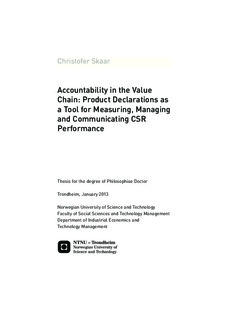| dc.contributor.author | Skaar, Christofer | nb_NO |
| dc.date.accessioned | 2014-12-19T14:28:11Z | |
| dc.date.available | 2014-12-19T14:28:11Z | |
| dc.date.created | 2013-02-20 | nb_NO |
| dc.date.issued | 2013 | nb_NO |
| dc.identifier | 606782 | nb_NO |
| dc.identifier.isbn | 978-82-471-4107-6 (printed ver.) | nb_NO |
| dc.identifier.isbn | 978-82-471-4108-3 (electronic ver.) | nb_NO |
| dc.identifier.uri | http://hdl.handle.net/11250/266121 | |
| dc.description.abstract | Corporate Social Responsibility (CSR) is a concept applied to business organisations that choose to behave beyond the legal requirements for their impacts on society and the environment. A central activity of CSR is to communicate with society, i.e. through credible reporting the organisation makes itself accountable to the public. The scope of accountability is not limited to single organisations or single aspects. Social and environmental aspects in the whole value chain must be addressed.
The purpose of this research is to develop and present a framework for managing and communicating on CSR aspects in the value chain; appropriately called the framework for Management and Communication of Environmental and Social aspects (MCES). The theoretical background of the research is systems thinking, CSR and Industrial Ecology (IE). The framework integrates product reporting with a management system based on the principle of continual improvement. Economic aspects are not included.
A literature review of management, certification and reporting approaches identified two gaps in current practices. The first is that there are no globally recognised reporting approaches that deal with both the processes and the organisations that together constitute the value chain. The second is that there are no reporting approaches that deal with both social and environmental aspects in the value chain. The literature review suggests that there is a need for such an integrated approach. This is the first contribution of the research.
An exploratory case study was conducted in the Norwegian furniture industry in the period between 2005 and 2010. The case study was divided into four phases. Practical results include the DATSUPI software and a verified LCA database, which can be used together for documenting environmental and social performance of products and for creating Environmental Product Declarations (EPDs). The assessment of social performance in the case study is limited to chemical use in the production phase and emissions from products in the use phase. From this comes the second contribution of the thesis, integrating product emissions in the use phase into a Life Cycle Assessment (LCA), which can in turn be included in a product declaration.
The third contribution of the research is the MCES framework, which integrates product reporting with a plan-do-check-act management system. The framework is based on product reporting as a central activity in a continual improvement perspective, where improvement can be for a product, for a reporting system, for an organisation or for a value chain. The framework relies on the use of performance indicators with the intention of including both environmental and social aspects. The results of the case study indicate that the main challenge when applying such a framework is that of finding indicators that can be allocated and aggregated throughout the value chain and remain meaningful. This supports the initial findings of the literature review. Future progress depends on a scientific consensus on indicators and aggregation methods, which means that in the near term transparency in reporting is critical for CSR. | nb_NO |
| dc.language | eng | nb_NO |
| dc.publisher | Norges teknisk-naturvitenskapelige universitet, Fakultet for samfunnsvitenskap og teknologiledelse, Institutt for industriell økonomi og teknologiledelse | nb_NO |
| dc.relation.ispartofseries | Doktoravhandlinger ved NTNU, 1503-8181; 2013:9 | nb_NO |
| dc.relation.haspart | Fet, Annik Magerholm; Skaar, Christofer; Michelsen, Ottar. Product category rules (PCR) and environmental product declarations (EPDs). Life Cycle Assessment applications - Results from COST Action 530: 73-80, 2009. | nb_NO |
| dc.relation.haspart | Fet, Annik Magerholm; Michelsen, Ottar; Skaar, Christofer. Creating environmental product declarations (EPDs) - case study in the Norwegian furniture industry. Life Cycle Assessment applications - Results from COST Action 530: 238-244, 2009. | nb_NO |
| dc.relation.haspart | Fet, Annik Magerholm; Skaar, Christofer; Michelsen, Ottar. Product category rules and environmental product declarations as tools to promote sustainable products. Clean Technologies and Environmental Policy. (ISSN 1618-954X). 11(2): 201-207, 2009. <a href='http://dx.doi.org/10.1007/s10098-008-0163-6'>10.1007/s10098-008-0163-6</a>. | nb_NO |
| dc.relation.haspart | Skaar, Christofer; Fet, Annik Magerholm. Accountability in the Value Chain. Corporate Social Responsibility and Environmental Management. (ISSN 1535-3958). 19(4): 228-239, 2012. <a href='http://dx.doi.org/10.1002/csr.275'>10.1002/csr.275</a>. | nb_NO |
| dc.relation.haspart | Fet, Annik Magerholm; Skaar, Christofer. Bedriftenes produktansvar – en casestudie fra norsk møbelindustri. Bedrifters samfunnsansvar - Hvordan forene ønsker og praksis?: 337-368, 2010. | nb_NO |
| dc.relation.haspart | Skaar, Christofer; Jørgensen, Rikke Bramming. Integrating human health impact from indoor emissions into an LCA. The International Journal of Life Cycle Assessment. (ISSN 0948-3349), 2012. <a href='http://dx.doi.org/10.1007/s11367-012-0506-8'>10.1007/s11367-012-0506-8</a>. | nb_NO |
| dc.title | Accountability in the Value Chain: Product Declarations as a Tool for Measuring, Managing and Communicating CSR Performance | nb_NO |
| dc.type | Doctoral thesis | nb_NO |
| dc.contributor.department | Norges teknisk-naturvitenskapelige universitet, Fakultet for samfunnsvitenskap og teknologiledelse, Institutt for industriell økonomi og teknologiledelse | nb_NO |
| dc.description.degree | PhD i industriell økonomi og teknologiledelse | nb_NO |
| dc.description.degree | PhD in Industrial Economics and Technology Management | en_GB |

